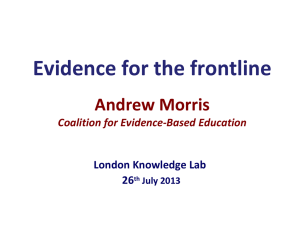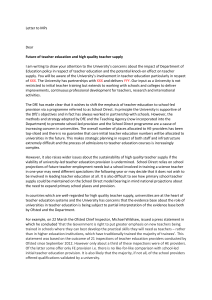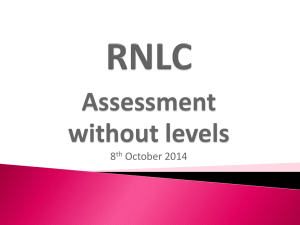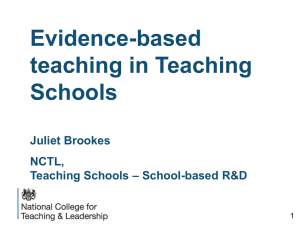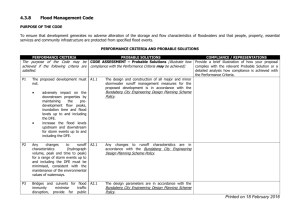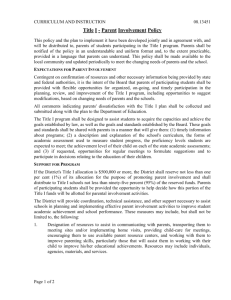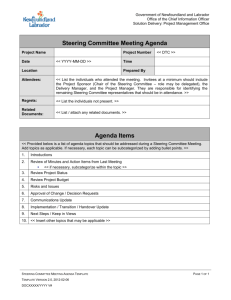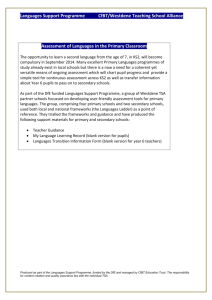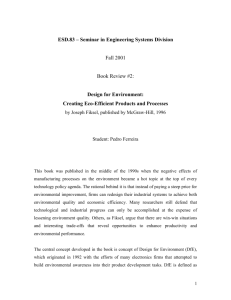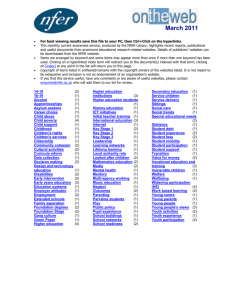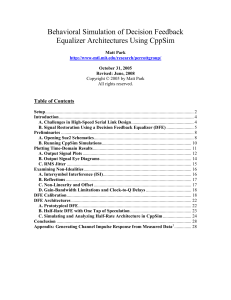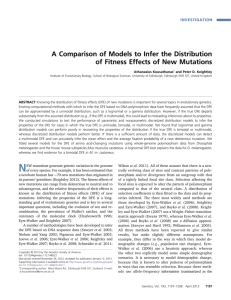DFE PROGRAMME FOR LANGUAGES SUPPORT TO SCHOOLS
advertisement
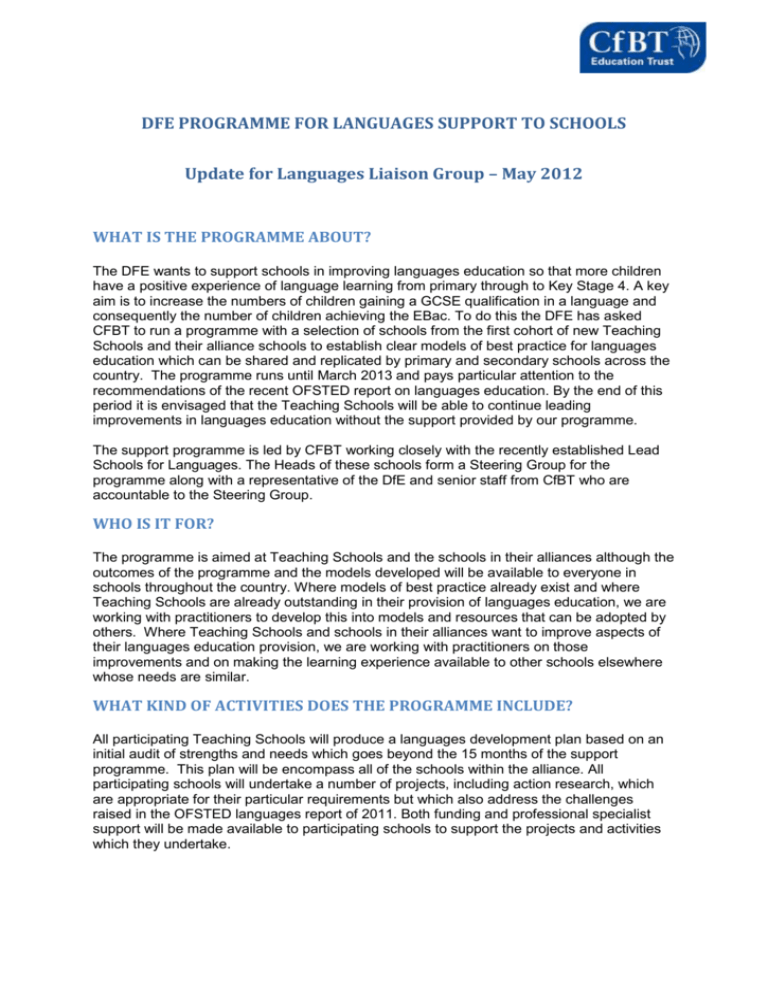
DFE PROGRAMME FOR LANGUAGES SUPPORT TO SCHOOLS Update for Languages Liaison Group – May 2012 WHAT IS THE PROGRAMME ABOUT? The DFE wants to support schools in improving languages education so that more children have a positive experience of language learning from primary through to Key Stage 4. A key aim is to increase the numbers of children gaining a GCSE qualification in a language and consequently the number of children achieving the EBac. To do this the DFE has asked CFBT to run a programme with a selection of schools from the first cohort of new Teaching Schools and their alliance schools to establish clear models of best practice for languages education which can be shared and replicated by primary and secondary schools across the country. The programme runs until March 2013 and pays particular attention to the recommendations of the recent OFSTED report on languages education. By the end of this period it is envisaged that the Teaching Schools will be able to continue leading improvements in languages education without the support provided by our programme. The support programme is led by CFBT working closely with the recently established Lead Schools for Languages. The Heads of these schools form a Steering Group for the programme along with a representative of the DfE and senior staff from CfBT who are accountable to the Steering Group. WHO IS IT FOR? The programme is aimed at Teaching Schools and the schools in their alliances although the outcomes of the programme and the models developed will be available to everyone in schools throughout the country. Where models of best practice already exist and where Teaching Schools are already outstanding in their provision of languages education, we are working with practitioners to develop this into models and resources that can be adopted by others. Where Teaching Schools and schools in their alliances want to improve aspects of their languages education provision, we are working with practitioners on those improvements and on making the learning experience available to other schools elsewhere whose needs are similar. WHAT KIND OF ACTIVITIES DOES THE PROGRAMME INCLUDE? All participating Teaching Schools will produce a languages development plan based on an initial audit of strengths and needs which goes beyond the 15 months of the support programme. This plan will be encompass all of the schools within the alliance. All participating schools will undertake a number of projects, including action research, which are appropriate for their particular requirements but which also address the challenges raised in the OFSTED languages report of 2011. Both funding and professional specialist support will be made available to participating schools to support the projects and activities which they undertake. HOW WERE SCHOOLS SELECTED? Teaching Schools and their alliances were selected according to a number of criteria agreed with the DFE. These included: Evidence of a commitment to languages education Evidence of past success in whole school improvement GCSE results for languages Geographical location Percentage of free school meals (FSM) Schools were invited to join the programme but the decision was up to each headteacher and his/her SLT or TSA Steering Group. The majority were very keen to participate but a small number declined due to other competing priorities following their designation as a Teaching School. The programme includes secondary, primary and special schools. WHAT ARE THE BENEFITS TO SCHOOLS? This programme provides the opportunity for Teaching Schools to share their best practice in with others and to improve teaching and learning wherever this might be needed. It provides support and additional funding to schools wishing to develop leadership in languages education. It provides participating schools with the focus, funding and professional support to develop projects and activities which meet specific needs for improvement. WHAT HAS BEEN ACHIEVED TO DATE? The Steering Group has been established and has already met once. The second meeting is in June. The target of 30 Teaching Schools and their alliance schools has been achieved and in accordance with the criteria agreed with the DfE. Recruitment of nine geographically dispersed, highly experienced practitioners has been completed so that they can begin to provide programme and subject specific support to the TSAs. All participating schools are now conducting an initial benchmarking exercise, the data of which is being analysed and returned to schools to support the production of the Development Plan. Teaching Schools are beginning the discussions which will result in the production of Development Plans for Languages which will extend at least one year beyond the life of the funded programme. We are in discussion with the NCSL to ensure that our subject specific training for the new SLEs dovetails with the generic training being provided through the NCSL itself. Work is being undertaken with headteachers from the Teaching Schools to determine the strategic priorities for discussion and debate at two programme events for Teaching School alliances to be held later in the year. These will be aimed at enabling TSAs to feel confident to take on clearer leadership role for languages once the funded programme comes to an end. WHERE CAN WE GET MORE INFORMATION ABOUT THE PROGRAMME? Because we are still very much in the early stages of the programme, we have not yet set out details of the programme on our website. However, if you would like further information about the programme, please do not hesitate to contact the following people: Kathryn Board (Head of Languages Strategy) Email: KBoard@cfbt.com Tel: 0118 902 1022/07827 953411 Carmel O’Hagan (Lead for Languages Education - Secondary) Email: COHagan@cfbt.com Tel: 0118 902 1043/07824 846866 Therese Comfort (Lead for Languages Education – Primary) Email: TComfort@cfbt.com Tel: 0118 902 1035/07825 190043
